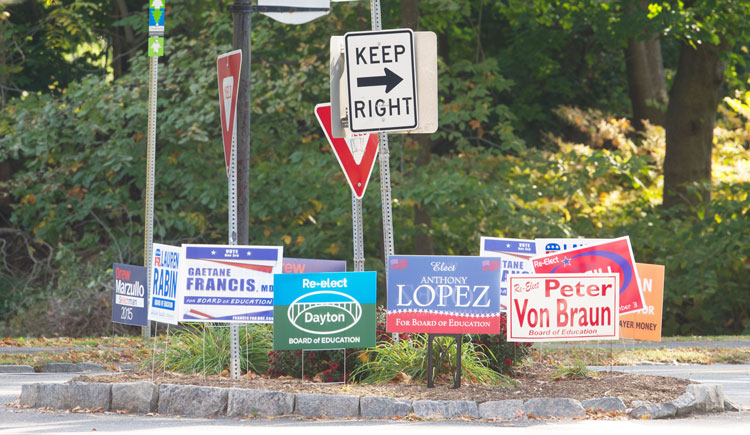
Does Greenwich need a different kind of first selectman? Frank Farricker, the chairman of the Democratic Town Committee (DTC) and his party’s nominee for first selectman this year, says yes.
Farricker envisions an “engaged” town leader who advocates ideas and spearheads action.
“I think the first selectman is a chief executive, the top cheerleader, and the only person elected in town who has the opportunity to bring it all together,” Farricker says. “We can do great things. We absolutely can. And we can afford it if we plan it properly.”
DTC member and former FirsSelectman Candidate, Lin Lavery, agrees: “The job of the first selectman is to move issues forward.”
Peter Tesei, the Republican who has been first selectman for eight years and seeks re-election November 3, describes his job not as advocacy but rather consensus-building. He calls his style “collaborative” and says it’s not only the right approach, but mandated by the Town Charter.
“I can champion policy, but making policy is something that is done by the full Board of Selectmen,” he says. “It’s not something you can do unilaterally…It’s important to respect the Town Charter; otherwise you risk overstepping boundaries and creating conflict.”
Tesei notes the first selectman’s position is limited by charter to town-services administration and public-safety concerns. “I think there’s a distinction between our prescribed duties and what they want them to be,” he says.
With just over a week before Election Day, the first selectman’s race has been something of an under-the-radar affair. No single issue has emerged to galvanize an electorate that seems anything but restive. Lawn signs are in less evidence than normal.
Edward Dadakis, a senior Republican Town Committee (RTC) member, said the quiet nature of this year’s campaign reflects that Tesei’s style is in favor: “When things are going well, not as much attention gets paid to the first selectman’s race.”
RTC chairman Jim Campbell concurred: “We have had a series of capital projects delivered on time, maintained our level of services, and kept tax increases below 3 percent. Our total indebtedness remains the lowest per capita in the state.”
Democrats argue a cost-centric approach to town governance is misplaced. In a debate with Tesei sponsored by the League of Women Voters on October 15, Farricker claimed Eastern Middle School has changed comparatively little from the time he went there in 1979, and that the same stands used when he played tuba at Greenwich High School are still in use: “We have a lot of work to do on our capital projects.”
“The Democrats have been making the case for some time that the Republicans are short-sighted,” says Peter Berg, a longtime DTC member. “Their approach has been to keep taxes low and allow things to deteriorate.”
Tesei says this is wrong, pointing to recent successes like the building of a public-safety facility and the upgrading of Glenville School.
No single issue has so far defined the first selectman’s race. But central issues in other races being decided next week have prompted discussion between the parties’ first-selectman candidates.
In the Tax Collector race, Democratic challenger Howard Richman runs on the concept that the office he seeks, currently held by Republican Tod Laudonia, shouldn’t be open for election in the first place. He advocates making the position appointed.
Farricker echoes this view. “End it, don’t mend it,” was his summation on the matter at the LWV debate last week, adding as first selectman he would advocate the change.
Republicans say to make tax collector an appointed position, the town charter must be amended. That has been tried before, and voted down by the town’s legislative body, the Representative Town Meeting.
“Electing someone who thinks the position should be appointed won’t automatically make it so,” Dadakis says.
Another race, for the Board of Estimate and Taxation, centers on the town’s current borrowing policy in paying for big-ticket items. Democrats say the town should take out longer-term loans, for as long as 20 years, to raise more capital and spread cost. Republicans say changing the current seven-year borrowing policy would burden future generations with debt, and risk overspending.
“Our views are very different,” Tesei says of Farricker. “I have prescribed a balanced approach, of keeping the mill rate low, versus ramping up borrowing. If you do that, you may as well buy into the state of Connecticut’s fiscal practices.”
Tesei has handily won each of his prior campaigns for first selectman, the first of which in 2007 was also against Farricker. He says he is hopeful he will win again.
Farricker claims he is hopeful, too, but adds the election isn’t just about who wins and who loses. “What comes out of the election is the agenda of the town for the next two years,” he says.




